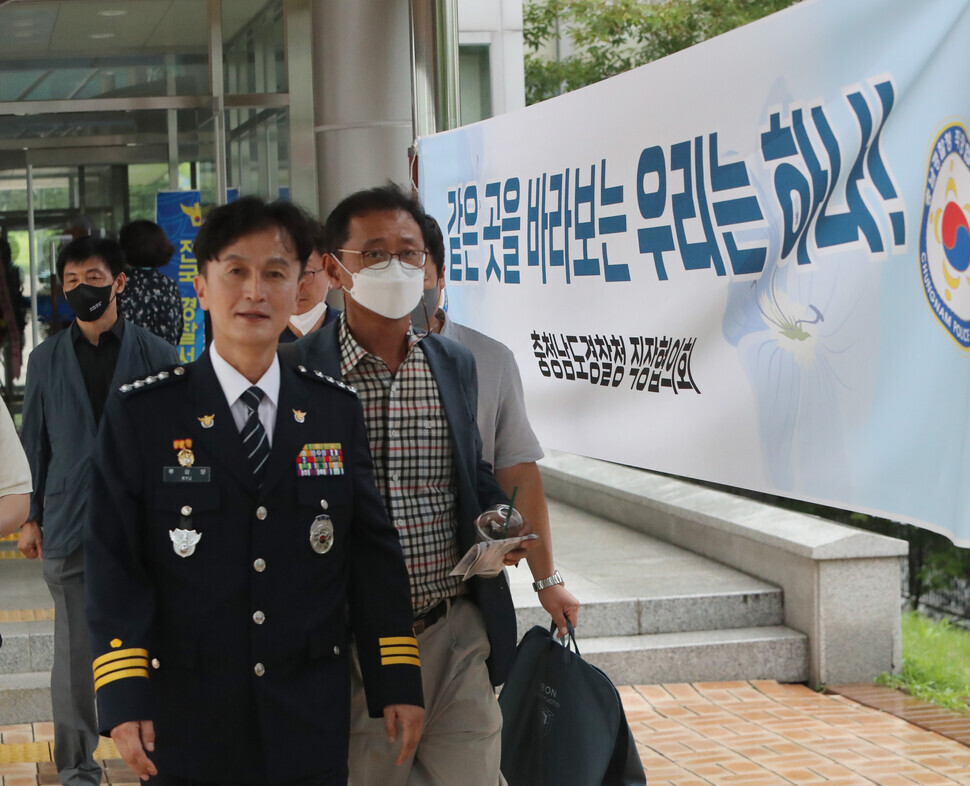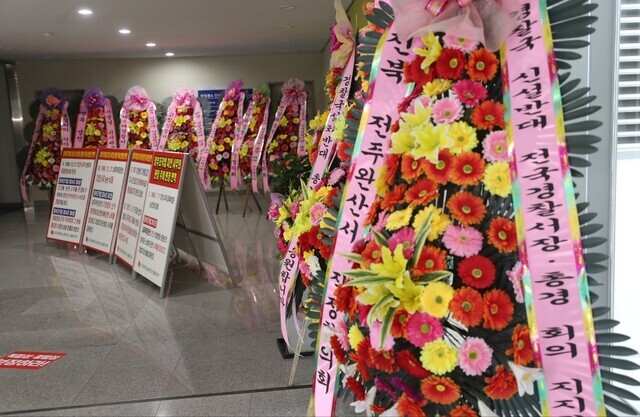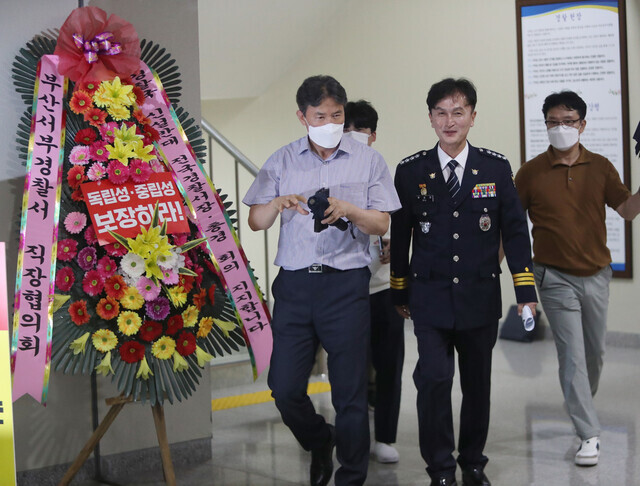hankyoreh
Links to other country sites 다른 나라 사이트 링크
Punitive response to gathering of Korean police chiefs prompts objections, bafflement

In the wake of a recent meeting of chiefs of police stations across Korea, the National Police Agency (NPA) began placing leaders of the meeting on standby and carrying out sweeping inspections.
The NPA implied that it would take collective disciplinary action against those who attended the meeting to oppose the creation of a new police bureau with the Ministry of the Interior and Safety.
Tempers are flaring within the police, as many claimed Minister of the Interior and Safety Lee Sang-min — a close associate of South Korean President Yoon Suk-yeol — is behind the sudden hard-line response to a meeting that had been announced ahead of time. Observers said the unprecedented collective inspections of police station chiefs are meant to enforce discipline and set an example ahead of the police bureau’s launch.
Remarks by the ruling People Power Party and presidential office demanding a stern response are prompting more and more critics to suggest that the administration — many of whose members have a background in prosecution — is becoming increasingly overt about its efforts to “tame” the police.
It is also being seen as representing a double standard: the administration’s rhetoric accusing the police station chiefs of “violating service regulations” with a single meeting to object to the violation of the police’s independence comes on the heels of the same administration’s encouragement of prosecutors who engaged in a month-long relay-style collective action to protest the amendment of the Prosecutors’ Office Act. At the time, the administration said the prosecutors’ actions were intended in the “interest of prosecutorial independence.”
Shortly after the nationwide police station chiefs’ meeting Saturday at the Police Human Resources Development Institute in Asan, South Chungcheong Province, the NPA had one of the meeting’s leaders — Ryu Sam-yeong, the chief of Ulsan Jungbu Police Station and a member of the fourth graduating class of the Korean National Police University — placed on standby, while it attempted to acquire a list to carry out inspections of 56 other police station chiefs who took part in the meeting.
Among police, the sudden punitive reassignment sparked both objections and bafflement.
The meeting was first proposed on July 18, and after its location and date were made public on July 20, the police leadership did indicate that it was against the meeting, but made no mention of disciplinary action or any other strict response. Indeed, Yoon Hee-keun, the nominee for NPA commissioner general, went so far as to schedule a report from Ryu on Monday to hear about the meeting’s outcome.

At 2 pm on Saturday, a total of 189 out of roughly 650 police station chiefs nationwide attended the meeting (56 in person, 133 online) to exchange opinions on the creation of an MOIS police bureau, which is scheduled to launch on Aug. 2.
Police station chiefs who were not present for the meeting but supported the aims sent potted rose of Sharon plants to the venue with their names attached. With them also included in the count, a total of 357 police station chiefs took part in the collective action — or more than half nationwide.
But while the meeting was going on, Yoon Hee-keun abruptly issued orders at around 4 pm for the attendees to disperse. At 5:30 pm, 30 minutes before the meeting was scheduled to end, he announced plans for disciplinary action, declaring that attendees would be “dealt with sternly.”
The candidate for police commissioner general claimed that noncompliance with the order to disperse would constitute a violation of the attendee’s duty of obedience according to the State Public Officials Act. The unexpected order placing Ryu Sam-yeong on standby came at around 7:30 pm.
Many among the police suspected that the personnel actions were a case of Yoon Hee-keun bowing to orders from the Minister of the Interior and Safety or other higher-ups.
“It would be strange not to have at least one meeting about an institution that’s going to mean important changes for the police system,” said one greater Seoul-area police station chief who attended the meeting.
“It’s difficult to comprehend why they’re carrying out inspections and treating [attendees] like criminals for not dispersing a meeting of police station chiefs, which wasn’t even any kind of illegal demonstration,” they added.
Ryu told the Hankyoreh that the actions were “proof in and of themselves of why the minister of the interior safety should not be allowed to exercise personnel authority through a police bureau.”

Having assumed the chairpersonship of the National Assembly Public Administration and Security Committee over the course of parliamentary committee composition negotiations — which gives it jurisdiction over NPA and police bureau duties — the ruling People Power Party blasted the police station chiefs’ meeting in messages on Sunday.
The committee’s chairperson, Lee Che-ik, wrote a Facebook post announcing plans to “investigate the entire police organization for violations of service regulations.”
Even the president’s chief of staff, Kim Dae-ki, who had not spoken out much about issues since Yoon Suk-yeol took office as president, paid a surprise visit to the presidential office’s press room in Seoul’s Yongsan neighborhood to criticize the “inappropriate actions” and join in the effort to enforce police discipline.
The opposition Democratic Party announced that it was considering presenting a motion for Lee Sang-min’s dismissal as minister of the interior and safety, calling the response an “example of ‘security-based rule’ that is meant to keep the police in line.” The party also said it planned to address the issue at Yoon Hee-keun’s confirmation hearing before the National Assembly.
“Why are public prosecutors allowed to hold meetings while police station chiefs can’t? Is this something that warrants disciplinary action?” asked Woo Sang-ho, chairperson of the Democratic Party’s emergency committee, in remarks criticizing the ruling party’s double standard when it comes to collective action by prosecutors and police.
By Park Su-ji, staff reporter
Please direct questions or comments to [english@hani.co.kr]

Editorial・opinion
![[Editorial] Penalties for airing allegations against Korea’s first lady endanger free press [Editorial] Penalties for airing allegations against Korea’s first lady endanger free press](https://flexible.img.hani.co.kr/flexible/normal/500/300/imgdb/original/2024/0502/1817146398095106.jpg) [Editorial] Penalties for airing allegations against Korea’s first lady endanger free press
[Editorial] Penalties for airing allegations against Korea’s first lady endanger free press![[Editorial] Yoon must halt procurement of SM-3 interceptor missiles [Editorial] Yoon must halt procurement of SM-3 interceptor missiles](https://flexible.img.hani.co.kr/flexible/normal/500/300/imgdb/child/2024/0501/17145495551605_1717145495195344.jpg) [Editorial] Yoon must halt procurement of SM-3 interceptor missiles
[Editorial] Yoon must halt procurement of SM-3 interceptor missiles- [Guest essay] Maybe Korea’s rapid population decline is an opportunity, not a crisis
- [Column] Can Yoon steer diplomacy with Russia, China back on track?
- [Column] Season 2 of special prosecutor probe may be coming to Korea soon
- [Column] Park Geun-hye déjà vu in Yoon Suk-yeol
- [Editorial] New weight of N. Korea’s nuclear threats makes dialogue all the more urgent
- [Guest essay] The real reason Korea’s new right wants to dub Rhee a founding father
- [Column] ‘Choson’: Is it time we start referring to N. Korea in its own terms?
- [Editorial] Japan’s rewriting of history with Korea has gone too far
Most viewed articles
- 160% of young Koreans see no need to have kids after marriage
- 2Presidential office warns of veto in response to opposition passing special counsel probe act
- 3Hybe-Ador dispute shines light on pervasive issues behind K-pop’s tidy facade
- 4S. Korea “monitoring developments” after report of secret Chinese police station in Seoul
- 5Months and months of overdue wages are pushing migrant workers in Korea into debt
- 6OECD upgrades Korea’s growth forecast from 2.2% to 2.6%
- 7[Editorial] Penalties for airing allegations against Korea’s first lady endanger free press
- 8Inside the law for a special counsel probe over a Korean Marine’s death
- 9Japan says it’s not pressuring Naver to sell Line, but Korean insiders say otherwise
- 10S. Korea discusses participation in defense development with AUKUS alliance